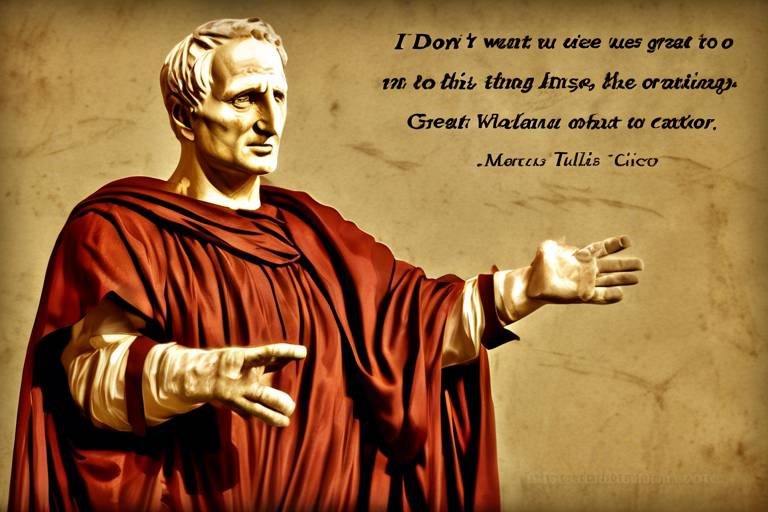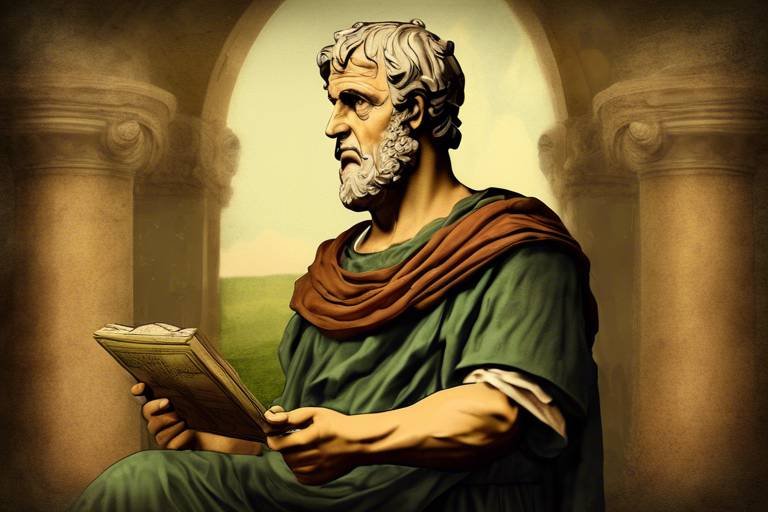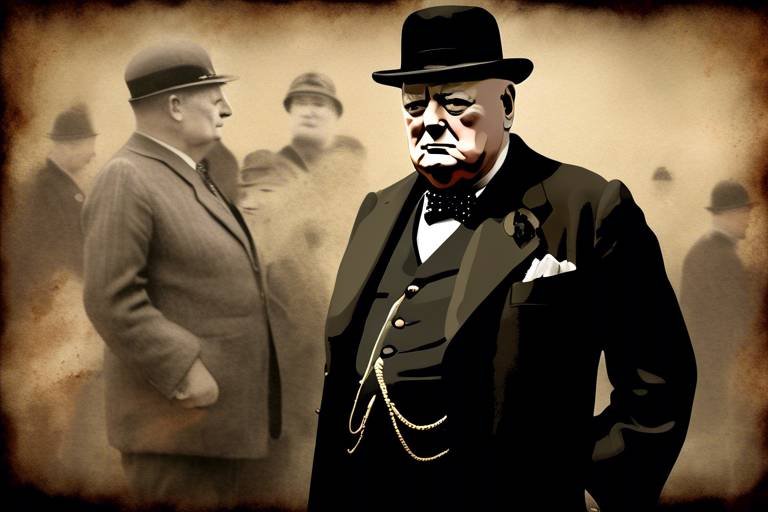Theodora: The Empress Who Changed History
Theodora, known as the Empress who changed history, was a formidable figure in the Byzantine Empire, leaving an indelible mark on politics, society, and religion during her reign. Her story is one of resilience, power, and influence, defying the norms of her time to shape a legacy that continues to captivate and inspire.

Early Life and Background
Theodora, the Empress of the Byzantine Empire, was not born into royalty or nobility but rather started her life in a vastly different setting. She began her journey as an actress, a profession considered scandalous and disreputable in the rigid societal norms of the time. Despite the challenges she faced, Theodora's charisma and intelligence set her apart, eventually catching the eye of Emperor Justinian. Their union marked the beginning of a partnership that would shape the course of history.
From her humble beginnings, Theodora's unconventional rise to power alongside Emperor Justinian provided her with a unique perspective on governance. Her experiences as an actress instilled in her a deep understanding of human nature and the ability to navigate complex political landscapes with finesse. This background influenced her approach to ruling the empire, allowing her to challenge traditional norms and advocate for marginalized groups.
As Empress, Theodora wielded significant political influence, actively participating in decision-making processes and championing various reforms. She was a staunch advocate for women's rights, working to elevate the status of women within society and granting them legal protections. Her laws aimed at safeguarding the underprivileged and oppressed reflected her commitment to social justice and equality.
Furthermore, Theodora's support for the Monophysite faction in religious matters sparked controversies within the empire. Her influence on theological discussions and church policies highlighted her willingness to challenge established beliefs and promote tolerance towards differing viewpoints. Despite facing opposition from religious authorities, Theodora remained steadfast in her convictions, leaving a lasting impact on the religious landscape of the Byzantine Empire.
The Empress also left behind a remarkable architectural legacy, contributing to the construction of iconic buildings such as the Hagia Sophia. These structures not only served as symbols of Byzantine grandeur but also reflected Theodora's patronage of the arts and her dedication to promoting cultural achievements. Her architectural projects continue to inspire awe and admiration, showcasing her enduring influence on Byzantine art and architecture.

Political Influence and Reforms
Empress Theodora wielded significant political influence during her reign, challenging traditional gender roles and advocating for social reforms that aimed to uplift the marginalized segments of society. Her commitment to **empowering women** was groundbreaking for the time, as she actively promoted laws that granted women more rights and protections. Theodora's efforts in **advocating for the underprivileged** were evident in her policies aimed at improving the living conditions of the poor and providing support for those in need.
One of Theodora's most notable achievements was her role in **implementing laws** that safeguarded the rights of women, including regulations against forced prostitution and the protection of women's property rights. Through her political influence, she sought to **challenge societal norms** and create a more just and equitable society for all individuals, regardless of their social status.
Furthermore, Theodora's commitment to **social justice** extended to her efforts in advocating for the rights of **enslaved individuals**, working to improve their conditions and provide avenues for freedom. Her reforms aimed to address the systemic injustices prevalent in Byzantine society, setting a precedent for future rulers to prioritize the well-being of all citizens.
By championing for **the oppressed** and marginalized groups within society, Empress Theodora left a lasting impact on the political landscape of the Byzantine Empire, reshaping governance practices and instilling a sense of **compassion and empathy** in the ruling class. Her legacy as a reformer and advocate for social change continues to inspire movements for **equality** and **justice** to this day.

Religious Controversies
During her reign as Empress of the Byzantine Empire, Theodora found herself embroiled in religious controversies that shaped her legacy and influence on theological discussions. One of the most significant controversies surrounding Theodora was her support for Monophysitism, a belief that Jesus Christ had only one nature rather than two distinct natures, human and divine. This theological stance put her at odds with the Chalcedonian Church, which upheld the doctrine of two natures in Christ.
Theodora's advocacy for Monophysitism led to tensions within the empire and strained relations with the ecclesiastical authorities. Despite facing opposition from religious leaders, she remained steadfast in her support for this belief, influencing church policies and theological debates during her time as empress. The controversy surrounding Monophysitism not only highlighted Theodora's willingness to challenge established norms but also showcased her determination to promote her beliefs, even in the face of resistance.
Furthermore, Theodora's involvement in religious controversies extended beyond theological debates. She played a pivotal role in shaping the religious landscape of the empire, using her influence to protect and support Monophysite clergy and communities. Her actions not only reflected her personal convictions but also demonstrated her commitment to championing religious tolerance and diversity within the Byzantine Empire.

Architectural Legacy
The architectural legacy of Empress Theodora is a testament to her vision and influence in shaping the Byzantine Empire's artistic landscape. One of the most notable contributions attributed to Theodora is her involvement in the construction of the iconic Hagia Sophia, a masterpiece of Byzantine architecture that stands as a symbol of her grandeur and patronage.
Through her patronage of architectural projects, Theodora not only sought to showcase the empire's wealth and power but also to create spaces that reflected the Byzantine aesthetic and religious beliefs. The Hagia Sophia, in particular, with its innovative dome design and intricate mosaics, exemplifies the fusion of art, architecture, and spirituality that defined the Byzantine era.
Furthermore, Theodora's architectural endeavors extended beyond the Hagia Sophia, encompassing the construction and renovation of numerous churches, monasteries, and palaces throughout the empire. These structures not only served as places of worship but also as symbols of imperial authority and cultural identity, leaving a lasting impact on Byzantine art and architecture.
Her architectural legacy continues to inspire artists, architects, and historians, who study her contributions to understand the artistic and cultural achievements of the Byzantine Empire. The enduring beauty and significance of the buildings she commissioned serve as a reminder of Empress Theodora's lasting influence on the architectural heritage of the empire.

Empress Theodora's Diplomatic Skills
Empress Theodora's diplomatic skills were renowned throughout the Byzantine Empire and beyond, solidifying her reputation as a shrewd and effective leader. She navigated complex political landscapes with finesse, using her intelligence and charisma to forge alliances and maintain stability within the empire. Theodora played a crucial role in negotiating with foreign powers, ensuring peace and security for her people. Her ability to communicate effectively and build relationships with other rulers was instrumental in securing the Byzantine Empire's position on the world stage.
One of Theodora's notable diplomatic achievements was her role in mediating conflicts and resolving disputes between different factions, both within the empire and with external powers. Her keen understanding of geopolitical dynamics allowed her to broker agreements that benefited the Byzantine Empire strategically and economically. Theodora's diplomatic efforts were instrumental in preserving the empire's influence and power, earning her respect and admiration from allies and adversaries alike.
Furthermore, Empress Theodora's diplomatic acumen extended to her management of internal affairs, where she skillfully balanced competing interests and factions to maintain cohesion and unity within the empire. By fostering dialogue and collaboration among diverse groups, Theodora promoted a sense of inclusivity and cooperation that strengthened the Byzantine state. Her ability to navigate intricate political challenges with grace and tact cemented her reputation as a formidable diplomat and leader.

Legacy and Historical Impact
Empress Theodora's legacy transcends time, leaving an indelible mark on history that continues to shape contemporary discussions and debates. Her reign as a powerful figure in the Byzantine Empire not only challenged societal norms but also laid the foundation for future feminist movements and political discourse. Theodora's unwavering commitment to championing women's rights and advocating for the marginalized set her apart as a trailblazer in an era dominated by patriarchal structures.
Furthermore, Theodora's influence extended beyond her advocacy for social reforms and political decisions. Her architectural legacy, notably her contributions to the construction of iconic buildings like the Hagia Sophia, showcased her keen eye for artistry and innovation. These architectural marvels stand as a testament to her vision and enduring impact on Byzantine art and architecture, inspiring generations of artists and architects.
Historians and scholars alike continue to analyze and interpret Theodora's historical impact, drawing from a myriad of sources that offer varying perspectives on her reign. Through historical records, literature, and art, Theodora's complex persona has been immortalized in different forms, each shedding light on her multifaceted character and the controversies that surrounded her rule.
As a feminist icon and influential ruler, Theodora's legacy serves as a reminder of the power of resilience and determination in the face of adversity. Her ability to navigate the intricate web of politics, religion, and diplomacy exemplifies her enduring influence on shaping the course of history. From negotiating with foreign powers to advocating for social justice, Theodora's impact reverberates through the annals of time, cementing her place as a pivotal figure in the tapestry of human civilization.

Historical Depictions and Interpretations
Historical Depictions and Interpretations of Empress Theodora offer a fascinating insight into how she has been portrayed throughout history. Various historical records, literature, and artworks have depicted Theodora in diverse ways, shaping her image and legacy over the centuries. Some accounts paint her as a ruthless and manipulative figure, while others highlight her intelligence, political acumen, and compassion for the marginalized. Artists have captured her beauty and power in stunning mosaics and paintings, immortalizing her in Byzantine art. Theodora's complex character and controversial decisions have sparked debates among historians and scholars, leading to a multitude of interpretations that continue to intrigue and captivate audiences today.

Theodora's Enduring Influence
Empress Theodora's legacy transcends time, leaving an indelible mark on history that continues to influence various aspects of society. Her enduring influence extends beyond her reign in the Byzantine Empire, shaping feminist movements, political discourse, and scholarly debates to this day. Theodora's unwavering commitment to championing for women's rights and advocating for the marginalized set a precedent for future generations to challenge societal norms and fight for equality.
Furthermore, Theodora's diplomatic skills and strategic alliances paved the way for political stability within the empire, showcasing her ability to navigate complex international relations with finesse. Her legacy as a skilled negotiator and diplomat serves as a model for modern-day leaders seeking to forge alliances and maintain peace amid turbulent times.
In addition to her political acumen, Theodora's architectural contributions, particularly in the construction of iconic buildings like the Hagia Sophia, continue to inspire architects and artists worldwide. The grandeur and artistic innovation displayed in these structures reflect Theodora's vision for blending beauty with functionality, setting a standard for Byzantine art and architecture that endures through the ages.
Moreover, Theodora's unwavering support for Monophysitism and her influence on theological discussions have sparked debates and interpretations that resonate in religious circles today. Her complex relationship with the church and her impact on religious policies highlight the intersection of faith and governance, underscoring the lasting implications of her decisions on religious practices.
As history continues to unravel the layers of Empress Theodora's legacy, her multifaceted persona as a feminist icon, political strategist, and cultural patron remains a subject of fascination and admiration. Her enduring influence serves as a reminder of the power of individual agency in shaping the course of history and the profound impact one person can have on the trajectory of a civilization.
Frequently Asked Questions
- Who was Empress Theodora?
Empress Theodora was a powerful figure in the Byzantine Empire who defied societal norms and influenced political decisions, social reforms, and religious policies during her reign alongside Emperor Justinian.
- What were some of Theodora's major contributions?
Theodora championed for women's rights, implemented laws to protect the underprivileged, advocated for the oppressed, supported Monophysitism, and contributed to the construction of significant architectural landmarks like the Hagia Sophia.
- How did Theodora impact history?
Empress Theodora left a lasting legacy as a feminist icon, influential ruler, and key figure in Byzantine history, with her actions and policies continuing to inspire discussions and debates in modern times.
- What was Theodora's diplomatic role?
Theodora displayed diplomatic prowess by negotiating with foreign powers, maintaining stability within the empire, and securing alliances for the Byzantine Empire, showcasing her strategic skills in international relations.
- How is Theodora depicted in historical records?
Theodora has been portrayed in various ways in historical records, literature, and art, with different perspectives shaping her image and legacy over the centuries, leading to diverse interpretations of her character.



















